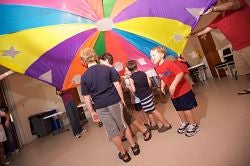Pirate Speech Camp offers fun, intense therapy for children with severe expressive language deficits
This is the second summer that East Carolina University’s Department of Communication Sciences and Disorders has offered the five-week camp in space provided by St. Paul’s Episcopal Church in downtown Greenville.
GREENVILLE, N.C. — Little boys run under a huge color wheel parachute as Pirate Speech Camp Director Julia Morrow holds up several stuffed animals.
“Shall we see if we can make the dinosaurs fly off?” asks Morrow. “Yes,” the children yell as she tosses the animals on the tarp. The 10 boys line themselves around the edge of the parachute, pumping their arms to fling the dinosaurs to the floor.

Campers run under a parachute. Photo by Cliff Hollis.
This is the second summer that East Carolina University has offered the five-week camp in space provided by St. Paul’s Episcopal Church in downtown Greenville. The camp provides a fun, intensive therapeutic environment to improve the communication skills of children with severe expressive language deficits including autism, said Morrow, coordinator of external clinical education in the Department of Communication Sciences and Disorders.
Counselors are first-year communication sciences and disorders graduate students in the College of Allied Health Sciences. Morrow also is assisted by Lori Kincannon, a speech language pathologist in the Pitt County Schools.
The camp was originally designed to help children maintain skills during the summer when school is out. “But we’ve had lots of parents telling us they see lots of growth in their children,” Morrow said.
The children are able to have fun, do arts and crafts, play on the playground, and are encouraged to interact and socialize with other children as much as possible, all while working on language skills outside a typical clinical environment, said counselor Taylor Chewning of Wilmington. Another positive outcome has been working collaboratively with other student counselors and learning from each other. “A lot of times you’re by yourself in clinic,” Chewning said. “Here at camp, we’re all together with one goal of helping these kids learn as much as possible.”
Camp time is finely structured with a set daily routine to provide group language activities, fine motor craft activities and gross motor activities like the parachute or indoor baseball. “The whole point is to work together,” said counselor Karyn Morrone of Sapphire.
During story time, all are at the table, watching as the teacher turns the pages of the book and raising their hand to answer questions.
“We will not allow the children to sit in the corner and withdraw, or engage in repetitive behaviors,” Morrow said. “They naturally don’t want to be engaged and we are prompting and facilitating changes in behavior.”
Counselor Kimberly Woolard served as teacher during the week themed “The Five Senses.” The counselors take turns as lead teacher and in individual activities.
“It has been a wonderful experience working at the camp, an experience that will definitely be helpful in the future. I have learned a lot about autism spectrum disorder and how to best work with those who have it, and I’m sure that this won’t be the last time these skills are used,” said Woolard, who is originally from Washington.
Depending on the availability of student counselors, Morrow said they hope to grow the camp to allow 16 children to register next summer.